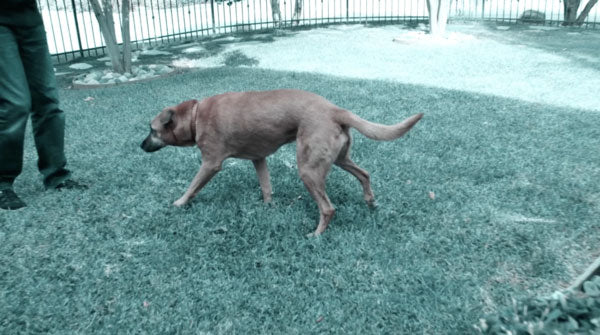Perhaps the most obvious, and common, clue that your dog’s not at the top of his or her game is a limp. Limping can come on gradually and get worse over time, or present immediately and acutely. The causes of limping are about as numerous as dogs themselves, including:
- Injuries
- Infections
- Inflammation
- Anatomical defect
- Cancer ligament disease
- Osteoarthritis and
- Degenerative disease.
The most common causes for limping are arthritis and injury, which both result in lessened and painful mobility. Sore or stiff joints cause our pets to move slowly or not at all.
Let’s take a “paws to shoulders” look at the possible causes for limping in your dog. Identifying exactly where your dog is feeling pain, when it started, and how acute the pain is will determine your next steps towards recovery:
Torn Paw Pad
Dogs can tear pads walking on rough pavement, terrain, or turning too sharply while running. Your pooch can even tear a paw pad if it walks too long on an unfamiliar surface. Chances are your dog will let you know immediately if it tears a pad by whining, limping or refusing to move. If you see and hear these signs, make a quick pad check. FInd a tear? Make sure the dog does not walk on the rough area that caused it, and consult your veterinarian for further care instructions.
Broken or Long Nails
A broken nail on our best friend is actually worse than when we humans break a nail. Imagine having to walk on a broken nail -- Ouch! Long nails bend and catch on just about everything, causing both immediate and long term pain. It’s important to examine your dog’s nails and keep them adequately short to prevent pain and limping. Have your dog’s nails trimmed regularly, but if one breaks seek veterinary care immediately.
Elbow and Hip Dysplasia
Dysplasia is a common condition in many breeds of dogs, many of whom will live their entire lives without symptoms while others will become lame early on. They will let you know when their condition is causing pain by walking slower than usual, laying down more, licking the sore spot and whining. Your vet can confirm this condition by a radiograph. One of the most effective treatments for this condition is VetSmart Formula’s Hip & Joint Complex from Pet Wellness Direct. The recommended daily dose has been proven to ease the symptoms of dysplasia in dogs over the age of two.
Panosteitis
We know it as “growing pains.” That’s right, large breed puppies typically from 5-18 months of age develop a bone inflammation that can cause limping. A sign your pup may be feeling the pain of “pano” is hopping or jumping from leg to leg. The condition can be short-lived or last a few months. There are pain management remedies your vet can help you explore.
Muscle Sprain and Tears
One of the most common injuries in dogs is a tear of the cranial cruciate ligament, or CCL. This is the ligament that attaches the femur to the tibia bones. The causes of this type of injury are varied. Canine athletes and very active, healthy dogs can be prone to injury from running too hard, jumping, or simply chasing other dogs in the dog park. But don’t be fooled, it can happen as easily in overweight, sedentary dogs. Your dog will likely react immediately to a sprain or a tear, fearful to put weight on the affected area or refusing to walk all together. CCL tears are very painful and serious and need immediate veterinary care. After the sprain or tear has mended, there are excellent supplements you can give your pooch to further the healing process, including VetSmart Formula’s Hip & Joint Complex. It contains sea cucumber, which delivers fast and natural pain relief.
Broken Bone
Your dog can limp along with a broken bone! Some breaks are very obvious, while others may be tiny fractures that go unnoticed or passed off as soreness that will go away; however, this is a serious issue that needs immediate veterinary attention. The faster your furry friend is treated, the quicker the healing time and the less likelihood of related injuries in the future.
Arthritis
Similar to humans, arthritis in dogs simply means “inflammation of the joints” and is a common problem for many breeds. A dog's joints and bone surfaces are normally covered with a thin layer of very smooth lubricated cartilage. In dogs with arthritis, cartilage within the joint undergoes change or damage, becoming less smooth and resulting in the bone surfaces rubbing together. Left untreated it can cause further damage and a condition known as degenerative joint disease. Veterinarians suggest administering supplements containing MSM and Glucosamine, including VetSmart Formula’s Hip & Joint Complex, whose unique combination of Green-Lipped Mussel, MSM, and Glucosamine rebuilds achy joints.
Bone Cancer
Osteosarcoma, or bone cancer, causes lameness in any leg. Tumors can be very painful growths and sometimes too small to see outside of a radiograph. Veterinary care is imperative as these cancers can and do spread quickly. While the result is most often the loss of the limb, the dog can go on to live a relatively normal life some years after the amputation. VetSmart Formula’s Hip & Joint Complex was specifically developed for dogs recovering from cancer.
As we can see, the causes for your dog’s limping can range from a long toe nail to bone cancer. Since some of these maladies are challenging to diagnose at home, your veterinarian can conduct a physical exam augmented by x-rays, CTs or MRIs to evaluate the condition of the joints and bones. Caution! Remember, never exercise a lame dog. In fact, the dog must be allowed to rest completely per your vet’s instructions, anywhere from a day to weeks. When the lameness subsides, continue resting the dog for at least another 24 to 48 hours. As always, persistent or worsening lameness should be evaluated by a veterinarian. There are amazing new treatments that can truly put your best friend at ease, promote healing, increase mobility and restore your pal to an active and fun filled life. Arguably the most effective of them is VetSmart Formula’s Hip & Joint Complex. To place an order now and see for yourself, CLICK HERE.
Critical Immune Defense
w/ Turkey Tail, Reishi, Shiitake, & Maitake Mushrooms + White Turmeric Root Extract
Fight Viruses, Dieases and Cancers
Learn MoreAdvanced Hip + Joint Complex
w/ Green-Lipped Mussel, Sea Cucumber, & MSM


















